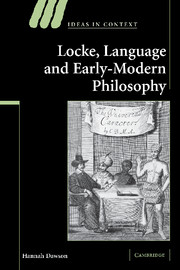Crossref Citations
This Book has been
cited by the following publications. This list is generated based on data provided by Crossref.
Ott, Walter
2008.
Locke on Language.
Philosophy Compass,
Vol. 3,
Issue. 2,
p.
291.
2010.
The Language of Law and the Foundations of American Constitutionalism.
p.
82.
Chitsaz, Maziar
and
Hodjati, Seyyed Mohammad Ali
2012.
Conceptualization in ideational theory of meaning: Cognitive theories and semantic modeling.
Procedia - Social and Behavioral Sciences,
Vol. 32,
Issue. ,
p.
450.
Andersson, Daniel C.
2013.
Renaissance Empiricism and English Universities: Recent Work.
Journal of Early Modern Studies,
Vol. 2,
Issue. 2,
p.
171.
Pritchard, Timothy
2013.
Locke and thePrimarySignification ofWords: AnApproach toWordMeaning.
British Journal for the History of Philosophy,
Vol. 21,
Issue. 3,
p.
486.
Gevirtz, Karen Bloom
2014.
Women, the Novel, and Natural Philosophy, 1660–1727.
p.
15.
Lenz, Martin
2014.
Locke contre Leibniz à propos du langage : deux sortes d’externalisme ?.
Méthodos,
Ives, Peter
2014.
De-politicizing language: obstacles to political theory’s engagement with language policy.
Language Policy,
Vol. 13,
Issue. 4,
p.
335.
Serjeantson, Richard
2014.
Francis Bacon and the “Interpretation of Nature” in the Late Renaissance.
Isis,
Vol. 105,
Issue. 4,
p.
681.
Ives, Peter
2015.
Language Policy and Political Theory.
p.
41.
Capozzi, Mirella
2015.
Gli inizi di una metodologia della scoperta. L'emergere di un aspetto naturalistico della logica.
PARADIGMI,
p.
45.
Lowe, E.J.
2015.
A Companion to Locke.
p.
279.
Winkler, Kenneth P.
2015.
A Companion to Locke.
p.
212.
Crow, Matthew
2015.
Thomas Jefferson and the Uses of Equity.
Law and History Review,
Vol. 33,
Issue. 1,
p.
151.
Ashworth, E.J.
2015.
A Companion to Locke.
p.
82.
KOGANZON, RITA
2016.
“Contesting the Empire of Habit”: Habituation and Liberty in Lockean Education.
American Political Science Review,
Vol. 110,
Issue. 3,
p.
547.
Pearse, Harry
2016.
Historical faith and philosophical theology: the case of Thomas White.
Intellectual History Review,
Vol. 26,
Issue. 2,
p.
221.
Mika, Carl
2017.
Handbook of Indigenous Education.
p.
1.
Herrero, Montserrat
2017.
The “Philosophical Bible” and the Secular State.
The European Legacy,
Vol. 22,
Issue. 1,
p.
31.
Birlik, Pınar Türkmen
2017.
LOCKE’TA SÖZCÜKLERİN YETERLİLİĞİ VE YETERSİZLİĞİNDE UZLAŞIMIN ROLÜ.
Anemon Muş Alparslan Üniversitesi Sosyal Bilimler Dergisi,





